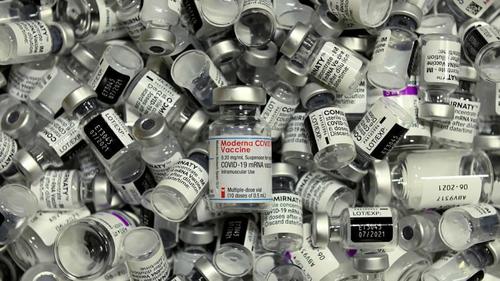COVID Vaccine Makers Prepares For Long Legal Battle As US Backs IP Waiver
Now that Germany has broken with the US over the question of whether to back a waiver for COVID vaccine IP that’s been proposed at the WTO, pharmaceutical giants like Pfizer that were planning on COVID-19 vaccines becoming a permanent revenue stream are seeing their opportunities for profit threatened. The proposal would require the support of other major developed nations to pass, and it’s unclear whether it will or not. But if it does, pharmaceutical companies who see their IP compromised would have limited options for recourse.
Matthew Howell, an IP attorney at Alston & Bird in Atlanta told Bloomberg that companies like Pfizer and Moderna might sue the US to recover some of their losses. Since manufacturing the vaccine is done in the US, the companies could take certain avenues for compensation in American courts. But that would likely only cover a fraction of their potential losses.
Other countries would offer few avenues for these companies to profit on their vaccine IP (even though most vaccine-makers promised not to profit off the jabs during the length of the pandemic, though judging by Pfizer’s most recent earnings, that period has already passed).
“Under the law they can get just and reasonable compensation for the use of their patented inventions” by another company in the US, as long as the government “provides authorization and consent for that use,” Howell said. However, when trying to make up for losses from an international manufacturer producing the vaccine overseas, the lawsuit avenue isn’t available.
“A lot of conduct outside the country wouldn’t be covered,” Howell said.
Lobbyists are already stepping up their claims that scrapping IP protections wouldn’t actually help developing countries vaccinate their populations more quicky.
“This change in longstanding American policy will not save lives,” said Stephen Ubl, the president and chief executive officer of PhRMA, the biopharma industry’s lobbying group. “This decision does nothing to address the real challenges to getting more shots in arms, including last-mile distribution and limited availability of raw materials.”
The US’s decision is still new, and much about the White House’s approach isn’t yet known. While Biden’s Trade Representative Katherine Tai has confirmed that the administration will support the waiver, it’s not clear whether the US might seek to limit the waiver to just the rights to produce the vaccine. Some WTO members, like India – a co-sponsor of the proposal along with South Africa – also want access to manufacturing and distribution, which they say would help them speed up their own rollouts.
“The pharmaceutical industry has legitimate concerns about India’s proposal, because the manufacturing and distribution innovations aren’t just limited to producing the Covid vaccine,” said Polk Wagner, a professor of intellectual property at the University of Pennsylvania.
“I don’t know how they would legally stop this moving forward, because it just becomes a decision by the World Trade Organization,” said Ellen ‘t Hoen, director of Medicines Law & Policy, a legal research group based in the Netherlands.
Circling back to the prospect of litigation, another source quoted by Bloomberg pointed out that patent litigation can take years to resolve through American, or international, courts.
But as pharmaceutical companies move to protect their IP, the question of optics will likely be more important.
Then there are the optics. She pointed to a lawsuit filed more than two decades ago in South Africa challenging cheaper AIDS drugs, an effort that the companies dropped under pressure.
“They can always take all kinds of legal action all over the planet,” she said. “But they’ve already acknowledged that what they did in 1998 in South Africa was a colossal mistake.”
Public perception aside, complex patent litigation can take years to wind its way through the courts with firms willing to spend millions on protecting their properties.
“The outcome of any litigation is years away, and if there were any it would be as between the drug companies and it’s unlikely to be around pandemic supplies,” said Stephen Reese, head of Clifford Chance’s intellectual property practice in London. “More likely it’ll be protecting the platform technologies that these vaccines are developed on.”
Looking ahead, representatives of the Swiss government said that they’re taking time to consider the US’s decision to support the waiver as the country mulls whether to follow suit.
“The US has changed its position within the WTO and we have a new situation. I am aware that the government is looking at the new situation and that means, we have to wait and see what the Swiss government will decide based on the new situation. The decision will be taken in Berne and we have to wait for that,” Switzerland’s Ambassador to India Ralf Heckner told PTI in an interview on Friday.
Like the US and Germany, Switzerland is home to many biotech companies who rely on IP protections as “the lifeblood of their industry,” as one supporter put it. At least two Swiss companies are involved in producing COVID vaccines, a government representative said. The industry will be waiting with baited breath to hear more from Switzerland as the government now must make a critical choice.
Tyler Durden
Fri, 05/07/2021 – 14:29
via ZeroHedge News https://ift.tt/3h9Uvhj Tyler Durden
